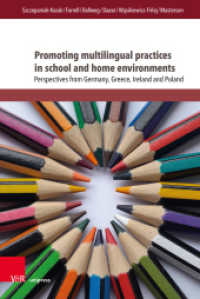Full Description
Fraudulent, harmful, or at best useless pharmaceutical and therapeutic approaches
developed outside science-based medicine have boomed in recent years, especially due to
the commercialisation of cyberspace. The latter has played a fundamental role in the rise
of false 'health experts', and in the creation of filter bubbles and echo chambers that have
contributed to the formation of highly polarised debates on non-science-based health
practices—online as well as offline.
By adopting a multidisciplinary approach, this edited book brings together
contributions of international academics and practitioners from criminology, digital
sociology, health psychology, medicine, law, physics, and journalism, where they critically
analyse different types of non-science-based health approaches. With this volume, we aim
to reconcile different scientific understandings of these practices, synthesising a variety
of empirical, theoretical and interpretative approaches, and exploring the challenges,
implications and potential remedies to the spread of dangerous and misleading health
information.
This edited book will offer some food for thought not only to students and academics
in the social sciences, health psychology and medicine among other disciplines, but also
to medical practitioners, science journalists, debunkers, policy makers and the general
public, as they might all benefit from a greater awareness and critical knowledge of the
harms caused by non-scientific health practices.
Contents
1. Introduction Anita Lavorgna and Anna Di Ronco; 2. Towards a better criminological understanding of harmful alternative health practices: a provider typology Anita Lavorgna and Heather Horsburgh; 3. Science denial: psychological processes underlying denial of science-based medical practices Sara Prot and Craig A Anderson; 4. Understanding the demand for illicit lifestyle medicines online: an analysis of the risk perception of consumers Rosa Koenraadt; 5. 'First do no harm': exploring non-evidence-based practices within the Ukrainian health sector Anna Markovska, Ganna Isayeva, and Sergyi Ostropolets; 6: 'Don't trust the experts!': Analysing the use of populist rhetoric in the anti-vaxxers discourse in Italy Ester Massa; 7: Quantum physics and the modern trends in pseudoscience Enrico Gazzola; 8: Who are the experts? Examining the online promotion of misleading and harmful nutrition information Heather Horsburgh and David Barron; 9: Activism against medicine on social media: untangling the #novax protest in Italy on Twitter Anna Di Ronco and James Allen-Robertson; 10: Traditional herbal medicine and the challenges of pharmacovigilance Nayeli Urquiza Haas and Emilie Cloatre; 11: Framing of CAM-adjacent health scams in the UK media: an interdisciplinary perspective Anita Lavorgna and Felicity L Bishop; 12: Dossier Hamer: the role of investigative journalism in exposing pseudomedicine Ilario D'Amato; 13: Concluding thoughts Anita Lavorgna and Anna Di Ronco








